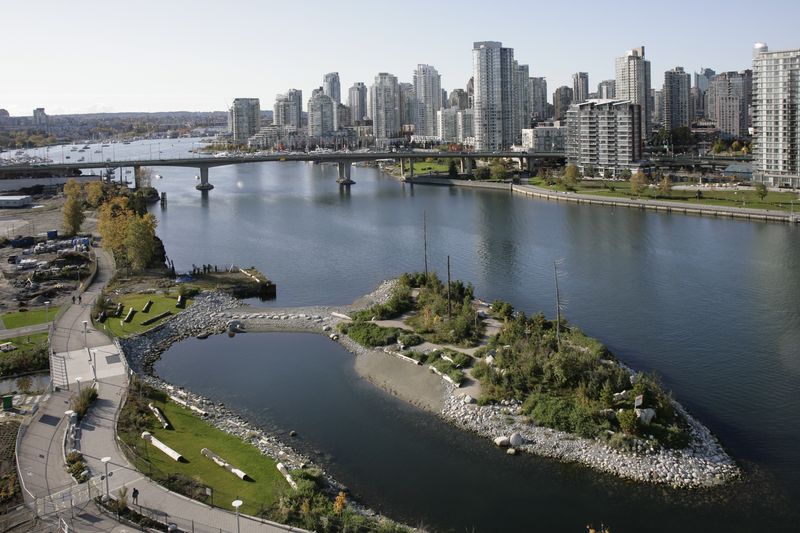
Picture credit: Theresa Nguyen
On Thursday, March 4, 2021, the BIOL 420 class met in-person for the first time! We walked along the seawall between the Maritime Museum and Olympic Village, learning about the area's history. We also had the opportunity to speak with Fraser Macdonald regarding his experience as a young fisherman and learn about Mark's restoration work creating Habitat Island (pictured below). Keep scrolling to read about my thoughts and reflection on the day's activities!

Picture credit: City of Vancouver
For me, the most memorable part of today’s activity was getting to learn more about the commercial fishing industry from Fraser Macdonald. I hope to pursue a career in enhancing sustainable fisheries, so learning about some of the struggles Canadian fishermen face firsthand was enlightening. To have sustainable fisheries, we need to consider the industry's social and economic impact and not just the environmental aspect. I also really enjoyed Fraser’s talk because my dad used to be a commercial salmon fisherman around the time I was born, and this class has given us a chance to connect. He doesn’t talk about that period of his life often, so having the background knowledge and asking him pointed questions about his experiences as a fisherman has been a good starting point in getting him to open up. Having these different worldviews and perspectives will help my career in fisheries management, keeping in mind the people whose livelihoods depend on this industry and who often don’t have much say about what goes on at the upper levels. Hearing both Fraser and my dad talk about the difficulties that come with being at sea for long periods and the financial burden it is to obtain licences highlights the disparities in the industry that are still present, even though their experiences occurred over 20 years apart. The stories remind me that it is imperative to keep in mind the different lived experiences no matter what career I end up in because working towards sustainability is not without ramifications for everyone.
Another aspect of today’s trip that I found equally enlightening is the fact that Habitat Island is an artificial island. I have been running along that stretch of the seawall for the last few years, and it has never occurred to me to stop and read the sign about Habitat Island (to be honest, I didn’t even see that sign until Mark pointed it out). It made me wonder how many other land modifications or restoration projects I have missed. Another aspect of Mark’s talk that shocked me is how much thought goes into conservation efforts. Obviously, you can’t just plunk a pile of sand into False Creek and hope for the best, but the extent to which Habitat Island was meticulously thought out, such as the slope differences on both sides of the island or the variation in the size of the rocks that make up the sides of the island. Granted, I don’t have any experience with restoration work whatsoever, but I would never have thought that an island's slope would significantly impact the organisms that colonize it. Hearing about Mark’s work opened my eyes to the biological and ecological challenges associated with restoration projects and all the thought and planning that go into them, not just the political difficulties.
Learning about the history of False Creek and seeing pictures of the streams all over Vancouver also made me realize that even though I’ve lived in Vancouver my whole life, I’ve been entirely ignorant about the city's history. I was utterly taken aback by the fact that I never took time to learn about just how different Vancouver used to be. It brings me back to the idea of shifting baselines where if I’m not aware of the past and my only basis is what I have seen in my lifetime, that has a significant impact on my awareness and decision-making in the future. This field trip has helped me realize that I need to be more mindful of the area I’m living in and be more curious about what I see and maybe what I don’t see.
A little additional tidbit, Melanie and I had a fantastic experience right after the trip as well. Because we both parked at the Maritime Museum, we decided to take the Aquabus back. We started speaking to our boat driver, and we told him that we had just finished a field trip for our ocean conservation course, and it turned out, he graduated with a degree in conservation (I believe). We had a fascinating conversation on some of the marine life he witnessed in the creek during his time as a boat operator, and we were able to teach him about some of what we learned, such as the fact that False Creek went down to Clark Dr. and up to 2nd Avenue. He found it super fascinating that False Creek used to be so much more extensive, and it was amazing to share what we learned with someone passionate about the topic!
Thank you so much for organizing the trip, Roshni, Tanvi, and Amanda! It was truly amazing to see real people, and I am incredibly grateful for the chance to learn more about the city I live in and the ocean surrounding it!
 icons at the top right corner of the subsection.
icons at the top right corner of the subsection.